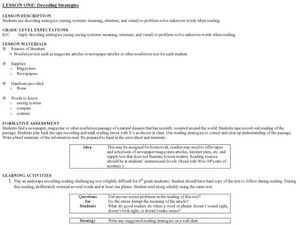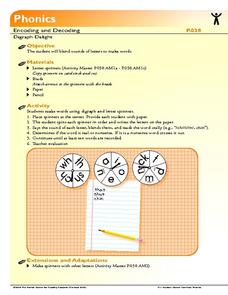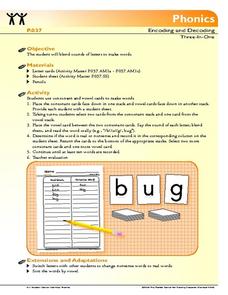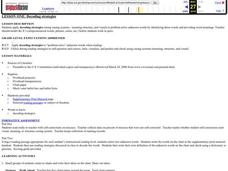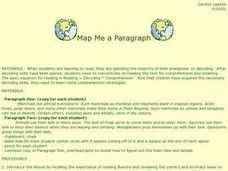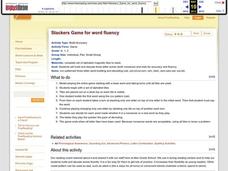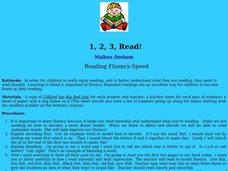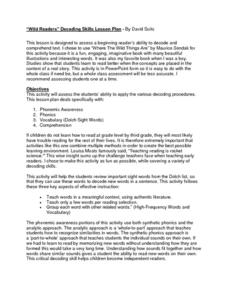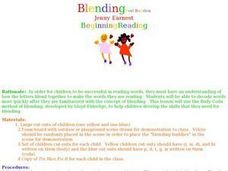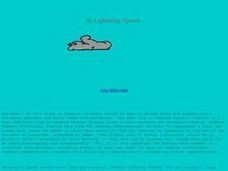Curated OER
Lesson One: Decoding Strategies
Review decoding strategies to read a chosen text. Readers tape themselves reading out loud, listen to the recording, and mark where they have misread words or phrases. They then discuss which words were misread and review how to correct...
Curated OER
Reading Strategies for Decoding Tricky Words
Help primary school pupils learn valuable reading strategies. As they choral read a poster or big book, they predict covered words and learn various reading strategies for figuring out an unknown word. This will help them gain an...
Florida Center for Reading Research
Phonics: Encoding and Decoding, Digraph Delight
There are three spinners to use in this phonic activity. Spinner one contains digraphs, spinner two contains vowels, and spinner three contains consonants. Learners spin each spinner, write down the letters they get, blend them to make a...
Florida Center for Reading Research
Phonics: Encoding and Decoding, Vowel Stars
Learners are given a star; each star contains a c_c form in the center and vowels on each point. They use the vowels to fill in the blank between the consonants making a simple CVC word. They write each word they make on a piece of...
Florida Center for Reading Research
Phonics: Encoding and Decoding, Letter Cube Blending
Emergent readers use a letter cube to identify, blend, and make words. They roll each of the three-letter cubes, mark down the letters they rolled, then blend the letter sounds together to make a word. They record each word on a...
Florida Center for Reading Research
Phonics: Encoding and Decoding, Three-In-One
Scholars use the provided pack of alphabet cards to construct basic CVC words, then write down each word they make in one of two columns. Column one is for real words and column two is for nonsense words.
Florida Center for Reading Research
Phonics: Encoding and Decoding, Make-A-Word
Little learners place a picture card on a magnetic board, say the name of the object on the card, then sift through alphabet magnets to find and spell the word they said.
Florida Center for Reading Research
Phonics: Encoding and Decoding, A Digraph A Word
Learners view a series of images, then choose digraphs, consonants, and vowels to spell out the object's name on each card.
Curated OER
Decoding Strategies
Young readers apply decoding strategies to identify unknown words. In this reading lesson, they read the Preamble and practice using decoding strategies. Small groups rotate to five charts that have questions regarding the Constitution...
Curated OER
Phonics: Decoding Words in Connected Text
Introduce your little ones to the wonders of phonemic decoding. They practice along as you sound out simple cvc words in the context of a sentence.
Curated OER
Lee and the Bee Flee to the Tree
Practice the strategy of decoding to become fluent readers with young scholars. They interact with the correspondence ee=/E/ as it deals with speech and text. The tongue twister, "Why did Lee and the bee flee to the tree?," is also...
Curated OER
My Reading Words in My Social Studies Book?
Connect social studies and language arts using this resource. After studying root words, have learners locate five words from their social studies book that have a prefix, suffix, or root word. This puts a new twist on practicing basic...
Curated OER
Map Me a Paragraph
There are so many great reading strategies. In this lesson, learners practice decoding. They break down two paragraphs to analyze and determine main ideas and details. They each observes ways to model as they map their paragraphs.
Curated OER
Stackers Game for Word Fluency
Explore words by building and decoding three-letter words. Real or nonsense words can be formed with the alphabet tiles. Practice fluency and blending sounds with CVC patterns.
Curated OER
1, 2, 3, Read!
Explain to your readers a variety of decoding strategies to improve their reading fluency. They observe the teacher modeling blending, then in pairs take turns reading the book Clifford the Big Red Dog. Learners then time each other...
Curated OER
Community Ripple
Originally designed to be used along with a text that is not included, this plan contains a graphic organizer and word guessing game to help readers use decoding strategies to gain new vocabulary. A set of questions relating to community...
Curated OER
Amazing As
Help young readers recognize the short vowel /a/ in written and spoken language. Through matching and listening activities, they discriminate the vowel sound /a/ from other phonemes. Learners associate the phoneme with its letter...
Curated OER
Phonics: Decode and Write Words with the “Silent e”
What happens when I add an 'e' to the word mad? It becomes made! Decoding and writing words with the silent e is the instructional activity for today. The class discusses what the e can do to a cvc word, then they practice adding e's to...
Florida Center for Reading Research
Word Steps
Blending basic CVC letters to make words is one of the first steps to independent reading. Provided here are several images of stairs and several letters to cut and arrange. The learner rearranges the letters to form CVC patterns, sounds...
Core Knowledge Foundation
Second Grade Skills Unit 4: The Job Hunt
Second graders practice skills, including spelling, grammar, and reading. Pupils examine vowel sounds and tricky words, nouns, and verbs. They begin the writing process by drafting a persuasive letter and decoding texts.
David Suits
“Wild Readers” Decoding Skills Lesson Plan
Set young readers on the path toward fluency with this phonemic awareness resource. Based on the award-winning children's book, Where the Wild Things Are, this lesson plan allows beginning readers to...
Curated OER
Using the Sounds of Words Reading Task
Young readers demonstrate phonemic awareness in words and blends, and recognize 100 high-frequency words. Use a nursery rhyme to point out rhyming words, and change the words by putting a new letter at the beginning. Each learner will...
Curated OER
Blending Best Buddies
Practice blending letters together to make the words learners are reading. They decode words familiarized with the concept of blending. This lesson utilizes the Body-Coda method of blending developed by Lloyd Eldredge. Each child...
Curated OER
At Lightning Speed
Review how to decode words and practice repeated readings for fluency. Kids review the cover-up method as a way to decode unknown words and then practice reading sentences for fluency and short passages with partners. They record their...
Other popular searches
- Decoding Skills
- Decoding Rules
- Word Analysis and Decoding
- Basic Decoding
- Decoding Grid
- Decoding Unfamiliar Words
- Decoding Text
- Decoding Words Lesson Plans
- Decoding Skills Second Grade
- Decoding a Secret Message
- Decoding Strategy Lessons
- Decoding a Message


